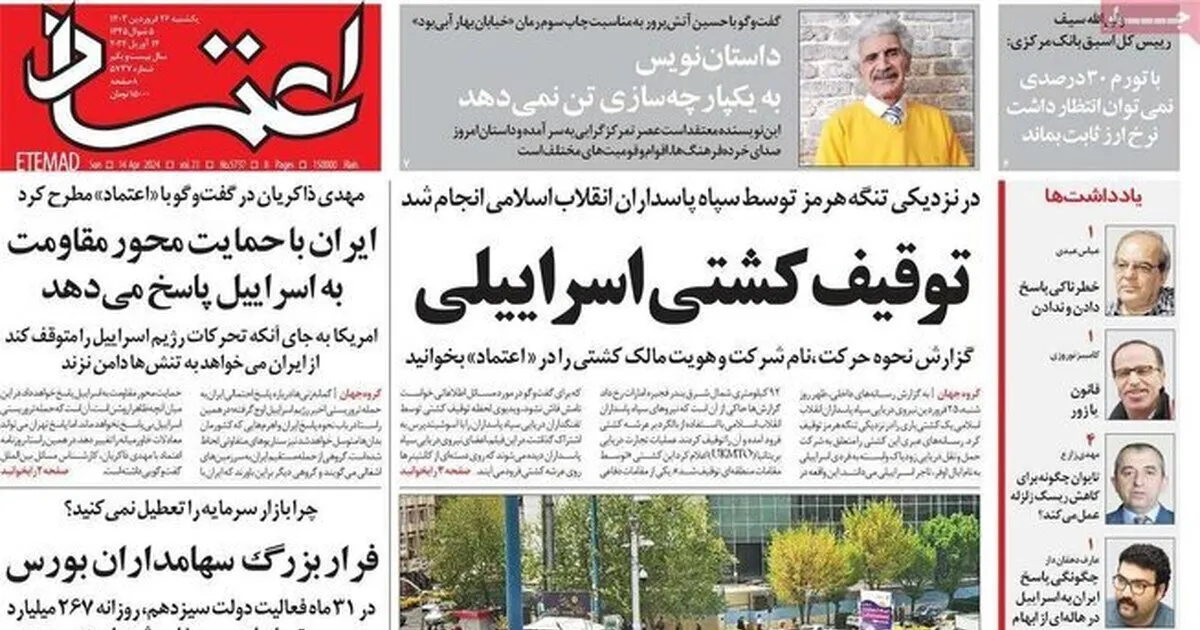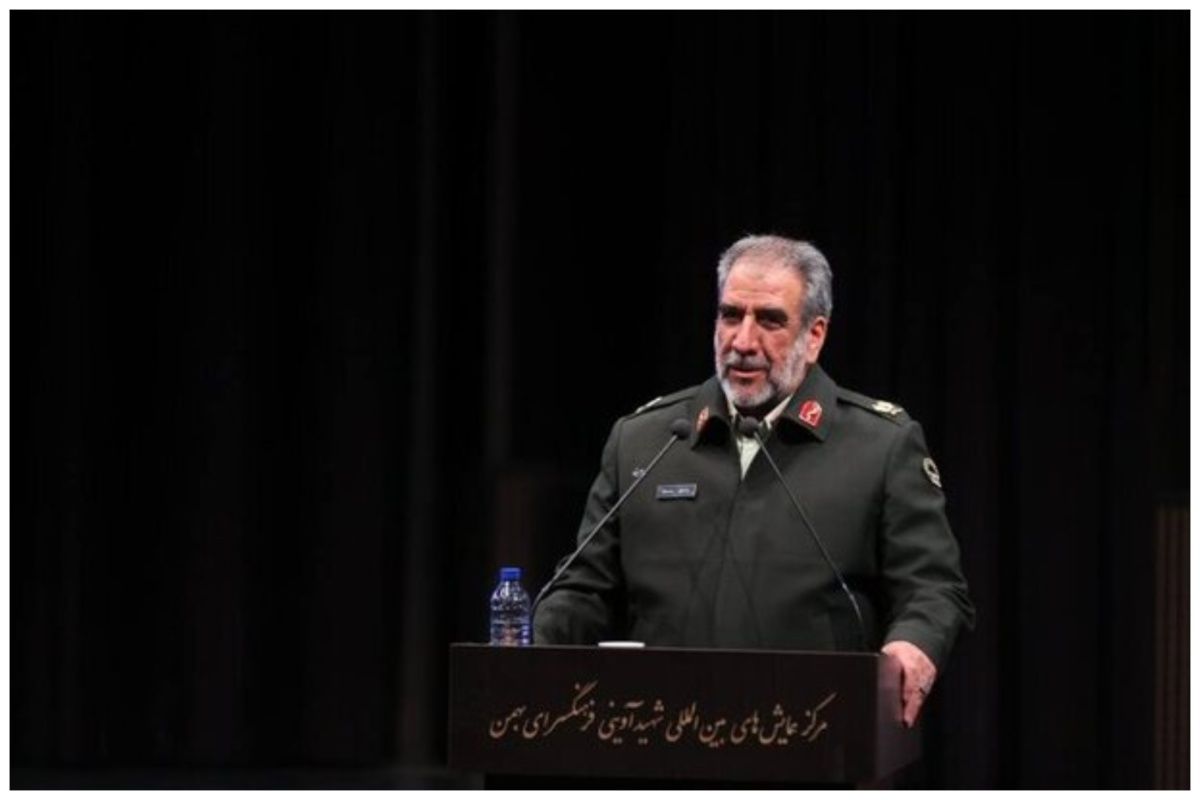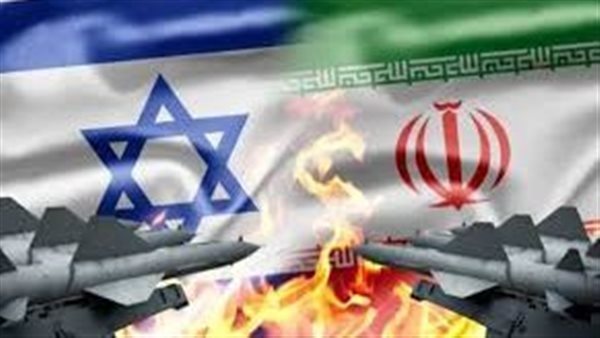
The Diplomatic Solution in the Post-war Era
In an editorial published by Setareh Sobh, columnist Ali Saleh Abadi delves into the escalating tensions between Iran and Israel. The editorial discusses the impact of statements made by Mahmoud Ahmadinejad, Iran’s former president, at the United Nations, advocating for the removal of Israel from the world map. Abadi notes the repercussions of such rhetoric, suggesting that it has strengthened Israel’s position and garnered increased support from the West and even Russia.
The editorial sheds light on Iran’s role in supporting various resistance groups, both overtly and covertly, across the Middle East. Abadi emphasizes the occasional attacks on Israel and the United States orchestrated by these groups in countries such as Lebanon, Syria, Iraq, and Yemen. He suggests that Israel has strategically portrayed itself as under threat from Iran and its allies, capitalizing on what he terms as “Iran-phobia” to bolster its own narrative and garner international support.
Abadi highlights the recent escalation in hostilities, particularly with Hamas’s attack on Israel on October 7, which ignited further conflict in the region. The editorial notes the subsequent accusations from Israel and the West, blaming Iran for supporting Hamas and other resistance groups, resulting in sanctions against Iran and impacting regional markets.
Further, the editorial discusses Israel’s recent attack on the Iranian consulate in Damascus on April 13, which resulted in the deaths of several Iranian officials. Abadi notes the significance of this unprecedented action and its impact on the already tense situation between Iran and Israel.
In response to Israel’s aggression, the editorial notes Iran’s retaliatory strike on Israel on April 13, the first in 45 years, employing drones, cruise missiles, and ballistic missiles. Abadi emphasizes the gravity of this action, which further escalated tensions in the region and affected market dynamics.
Amidst this heightened state of quasi-war, the editorial emphasizes the importance of exploring diplomatic avenues to address the conflict between Iran and Israel. Abadi stresses the government’s responsibility to ensure the welfare of its citizens by providing basic needs and controlling prices amid economic uncertainties.
The editorial underscores the pivotal role of the United States in the region and suggests that Iran should engage in negotiations with the United States to leverage internal political divisions and potentially influence the Israeli leadership. Abadi argues that US pressure has restrained Israel from further aggression against Iran.
The Risks of Responding and Not Responding
In a recent editorial for Etemad newspaper, Abbas Abdi reflects on the recent tensions between Iran and Israel following the latter’s attack on the Iranian consulate in Damascus. Abdi begins by explaining his decision to focus solely on this external issue due to the heightened possibility of war, asserting that in such circumstances, addressing any other domestic matters seems unreasonable. He notes the potential pitfalls of diverting attention to internal affairs amidst external tensions, which could inadvertently lead to ambiguity and accusations of collusion with foreign entities.
Abdi acknowledges that while a week has passed since the initial escalation, tensions persist and the situation remains precarious. He suggests that until diplomatic resolutions are reached with regional forces, the threat of conflict looms large. In the editorial, Abdi aims to articulate his perspective on the Israel-Iran crisis, outlining the inherent complexities and dangers he believes it poses, particularly within the framework of Iran’s current political landscape.
Contrary to prevailing opinions, Abdi asserts that Israel’s attack on the consulate was a reactionary measure, which, in his view, does not necessitate a military response from Iran. He contends that Israel views its actions as justified retaliation for the perceived damage inflicted during the Gaza war, which it attributes, at least in part, to Iran’s policies. However, Abdi maintains that Iran’s abstention from direct military retaliation should not be construed as a failure of its stated objectives, despite public perception suggesting otherwise.
The editorial identifies several factors contributing to the perception of Iranian inaction, including inflated expectations fueled by rhetoric from supporters of the status quo, as well as differences in the nature and significance of Israel’s attacks compared to Iran’s responses.
Abdi blasts Iran’s longstanding policy of non-recognition and outright condemnation of Israel, arguing that it has marginalized Iran on the international stage and deprived it of utilizing official diplomatic channels to address grievances against Israel. He contends that Iran’s refusal to engage with Israel directly leaves it vulnerable to escalating tensions and increased aggression from the Israeli side. Despite the rationale behind Iran’s reluctance to engage in direct confrontation, the writer suggests that its perceived passivity only emboldens Israel to escalate its actions further.
Yet, the editorial highlights the inadequacies of relying solely on deterrence strategies in the face of escalating tensions with Israel. Abdi argues that Iran’s current approach lacks efficacy in deterring Israeli aggression and underscores the need for a more nuanced and strategic diplomatic response to mitigate the risks of further conflict escalation.
Staggering and Unrealistic Rise in Prices
In an editorial for Ebtekar newspaper, Zhoobin Saffari addresses the longstanding issue of rising gasoline prices in Iran. Saffari acknowledges the arguments put forth by proponents of price increases, citing concerns over fuel smuggling and price disparities with other nations. However, he contends that such arguments must be examined in the context of broader economic variables, particularly considering the significant disparity in per capita income between Iran and other countries. Additionally, Saffari emphasizes the inflationary impact of gasoline price hikes, urging for a comprehensive assessment of the consequences.
Saffari critiques the approach adopted by successive Iranian governments, whereby gasoline prices are not adjusted in accordance with consumption levels. Instead, he notes a trend of sudden price hikes followed by cash subsidies, a practice initiated during the 10th and 11th administrations.
Addressing the recent proposal to increase fines for traffic violations, Saffari highlights the shock among the populace, given that fine rates have remained unchanged since 2016. He questions the rationale behind such drastic adjustments, suggesting that a more gradual approach aligned with inflation rates would have been preferable. Saffari asserts that a realistic assessment of economic indicators, irrespective of extraneous factors such as electoral politics, is essential to fostering stability and public trust in governance.
Drawing parallels with the management of exchange rates in the free market, Saffari advocates for a pragmatic approach to addressing inflation and the periodic need for energy price adjustments.
The writer laments the decline of scientific rigor in economic policymaking over the past decade, attributing this trend to the current economic challenges facing Iran. He underscores the need for a renewed commitment to evidence-based decision-making and prudent economic management to navigate the complexities of Iran’s economic landscape effectively.
This is the Real Revenge
In an editorial for Jomhouri Eslami newspaper, the focus is squarely placed on thwarting the strategies employed by adversaries to inflict harm upon Iran. The editorial contends that conventional methods of retaliation cannot reclaim lost ground or prevent future attacks. Instead, it argues for a more strategic approach aimed at frustrating the enemy’s ability to perpetrate further crimes against Iranian forces.
The editorial urges officials of the Iranian republic to resist the influence of extremist factions and refrain from impulsive and ill-considered actions. It specifically addresses the recent provocations by the Zionist regime against Iranian forces, particularly the martyrs of the Iranian consulate section in Damascus. The editorial cautions against falling into the trap of direct war, orchestrated by the United States and the Zionist regime, emphasizing that such a conflict would not serve Iran’s interests.
Acknowledging Iran’s robust offensive and defensive military capabilities, the editorial underscores the importance of their judicious and strategic utilization. It warns against the inadvertent deployment of these resources in accordance with the enemy’s designs. Rather, it advocates for a deliberate and calculated approach to decision-making to avoid playing into the enemy’s hands.
The editorial suggests that the most effective course of action at present is to staunchly block the avenues through which the enemy perpetrates crimes against Iranian forces. It highlights the possibility of collaboration between various elements within Syria, including local actors and Russian agents, who possess significant intelligence, security, and defense capabilities in Syrian territory.
In assessing the situation in Syria, the editorial cautions against overlooking the potential presence of double agents akin to historical figures like Eli Cohen, who clandestinely served Zionist interests. It underscores the need for cautious engagement with local Syrian elements while remaining vigilant against internal threats within Iran.
Regarding Russia’s role in Syria, the editorial questions why its formidable military capabilities have not been fully utilized to deter Zionist aggression against Iranian forces. It laments the significant losses suffered by Iran due to Zionist airstrikes in Syria and stresses the imperative of prioritizing the prevention of further casualties by plugging the vulnerabilities exploited by the enemy.

Shirin Ebadi: Attacking Israel, Enmity With the West and Hatred Against America Are Not People’s Chief Concerns or Demands

Renowned human rights activist Shirin Ebadi, a Nobel Peace Prize laureate and leader of the Human Rights Defenders Association, has expressed her concerns regarding the recent midnight assault by the Iranian republic on Israel. She asserts that this aggression, alongside the ruling establishment’s hostility toward the West and animosity toward the United States, does not align with the aspirations of the Iranian people.
In a recent article published on her social media accounts, Ebadi condemned the escalating militarism, which she attributes to the decisions of a single individual, warning that such actions will only escalate tensions for Iranians and the broader region.
The attack, launched late on Saturday, April 13, involved extensive missile and drone strikes on Israel, purportedly in retaliation for the killing of several high-ranking commanders and members of the Islamic Revolutionary Guard Corps’ (IRGC) Quds Force at the Iranian consulate in Damascus, Syria, on April 13. While Tehran blames Israel for the Damascus attack, Israel has neither confirmed nor denied its involvement.
Ebadi highlighted ongoing protests within Iran against the government’s policies, stating that the Iranian people continue to resist through street demonstrations and clashes with security forces. She emphasized that the Iranian government has been waging a silent war against its own people for some time, a conflict largely overlooked by the West. While criticizing Israel’s actions in Gaza and its human rights record, Ebadi also criticized Iran’s support for Hamas militants, asserting that it exacerbates the conflict in Gaza.
Ebadi stressed that the Iranian people, who have persistently advocated for a free and democratic society, do not support their government’s regional ambitions and called for attention to be directed toward their demands.
Regarding the cost of the recent attack on Israel, Ebadi lamented the billions of dollars spent on military endeavors, funds she believes could have been better allocated to Iran’s healthcare and education systems.
Ebadi noted the timing of the attack alongside renewed crackdowns on women in public spaces, indicating a broader pattern of authoritarianism within the Iranian republic.
شیرین عبادی: حمله به اسرائیل، دشمنی با غرب و کینهورزی با آمریکا، مسئله و مطالبه مردم نیست
Charges Leveled Against Etemad Newspaper’s Abbas Abdi

Mizan news agency, affiliated with Iran’s judiciary, reported that the Tehran Prosecutor’s Office has taken action against Etemad newspaper and political analyst Abbas Abdi for allegedly disturbing the psychological wellbeing of society. Abdi had published an article in Etemad newspaper criticizing Iran’s missile attack on Israel, stating that conventional deterrence against a country that denies Iran’s existence is meaningless and could lead to dangerous consequences.
Etemad is the second newspaper summoned for publishing material related to the missile attack. Previously, Jehan Sanat newspaper faced similar accusations. The Tehran Public Prosecutor’s Office accused both newspapers of destabilizing the psychological wellbeing of society and the country’s economic environment.
Furthermore, Yashar Soltani, manager of the Telegram channel ScanNews, has also been summoned. Soltani gained attention for exposing a land grabbing case involving Kazem Sediqi, a temporary imam of Tehran, and his sons.
The missile strikes against Israel, launched by Iran, were in response to an earlier attack attributed to Israel, which resulted in the deaths of several senior IRGC commanders. However, reports indicate that most of the drones launched by Iran were intercepted before reaching their targets in Israel.
Following the attack, the prices of gold and foreign currencies in the Iranian market surged, with the US dollar reaching 70,000 tomans. While the Tehran Prosecutor’s Office hailed the attack as successful, Reuters reported that many of the drones were shot down by Israeli and US jets before reaching Israel’s airspace.
New Measures Adopted by Iranian Police to Ensure Compliance With Hijab Code

The Tehran Police have initiated the Noor Plan to address social anomalies concerning hijab and chastity, with a focus on enforcing regulations pertaining to public dress codes. Abbas Ali Mohammadian, the police commander of Greater Tehran, stated that the plan has been rolled out across all streets and public spaces.
Mohammadian attributed the implementation of this plan to both legal obligations and the demands of religious citizens, emphasizing Iran’s reputation for law-abiding behavior. He noted that only a small percentage of individuals deviate from legal norms, necessitating police action to address issues such as non-compliance with hijab requirements.
Under the Noor Plan, individuals who have disregarded prior warnings regarding hijab regulations will receive special warnings, with legal action to follow. Mohammadian called for cooperation from the public, likening the situation to the collaborative efforts seen during Nowruz, Iran’s New Year celebration.
Regarding potential penalties, Mohammadian clarified that disobeying hijab regulations constitutes a violation of the law, equating it with a criminal offense. He expressed hope that such violations would be minimal.
Previously, the Greater Tehran Police Command issued a notice informing citizens of intensified enforcement of hijab and chastity laws, citing public demands and legal duties. The notice urged respect for legal and moral standards, warning of legal consequences for violators.
Last year, Major General Ahmadreza Radan, the chief commander of Law Enforcement Command of the Islamic Republic of Iran, announced efforts to combat hijab violations in various settings. Radan emphasized the societal importance of maintaining hijab standards, particularly in public spaces.
Advanced technology will be employed to identify violators, who will receive warnings initially. Repeat offenses may result in more severe measures, such as vehicle seizure or closure of establishments where violations occur frequently.
The Noor Plan underscores Iran’s commitment to upholding hijab and chastity laws, with a focus on public compliance and enforcement measures to deter violations.
Social Media Reacts: Mixed Responses to Iran’s Attack on Israel

Iran’s recent attack on Israel has sparked a flurry of reactions and discussions across social media platforms. Immediately following the news of the attack, users took to social networks to express their views and opinions on the matter. Hashtags such as “Iran,” “Israel,” “Beat Israel,” “World War III,” and “Iranians are with Israel” gained traction, highlighting the widespread attention the incident received.
Many supporters of the Iranian government expressed satisfaction with the attack, interpreting it as a display of governmental strength. Images capturing the jubilation of government supporters in Iranian streets were also circulated online.
Some users perceived the attack as a response to the deadly assault on the Iranian consulate building in Damascus. They speculated that if left unchallenged, Israel would have continued to target Iranian positions in the future.
However, concerns were raised about Israel’s potential retaliation and the escalation of tensions in the region. Critics of the Iranian government denounced the celebrations, emphasizing that war brings no joy. Additionally, they pointed out the economic repercussions of the attack, such as fluctuations in the dollar price and long queues for gasoline, which would ultimately burden the Iranian people.
Furthermore, there were apprehensions about the impact of heightened tensions on daily life. Some users reported canceled deals due to the fluctuating dollar price following the attack.
While some users believed that Iran’s attack was merely a display of power with minimal damage, others questioned the government’s priorities, highlighting the historical outcome of citizens bearing the brunt of such displays.
Opponents of the government highlighted the attack benefits Israel through the hashtag “Iranians are with Israel,” while others called for retaliatory measures against Israel, hoping to weaken the Iranian government.
Amidst these discussions, there were voices advocating for peace, emphasizing the destructive nature of war and questioning the government’s actions that have driven some to support military confrontation. These sentiments underscored the growing disconnect between the Iranian people and their government.
